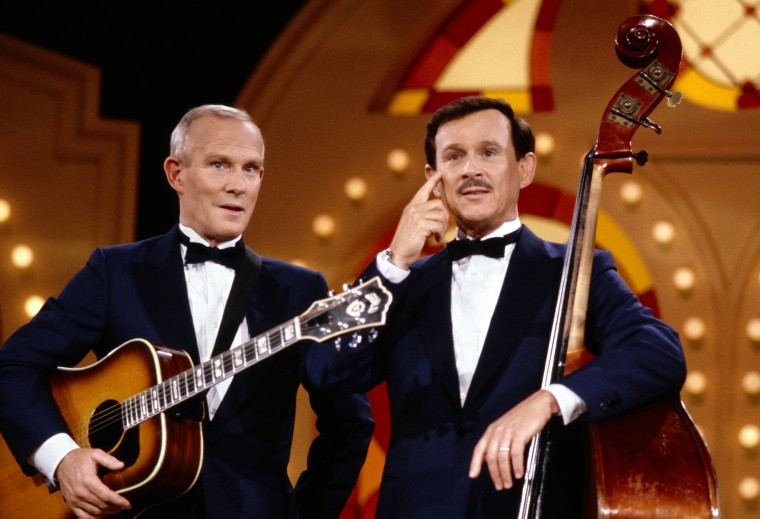Tom Smothers, the guitar-playing, yo-yo-slinging ditz of the famed Smothers Brothers, has died at the age of 86. Beloved by baby boomers of the left-leaning variety, the act featuring Tom and his sibling, Dick, is almost completely unknown to millennials and today’s Gen Zers.
To contemporary comedic sensibilities, the whole Smothers Brothers “concept” may seem anomalous.
When I’ve mentioned the group to my comedy classes, I’ve often been met only with blank stares and furtive attempts to Google them. The Smothers Brothers are unknown to The Youth. Which (says this Gen X observer) might be understandable but certainly is unfortunate. The dramas that emerged around their act — perhaps even more than the goofy antiestablishment jokes that were their bread and butter — foreshadowed and remain relevant to today’s comedic controversies. Their careers show us what ought to happen in a functional Comedic Liberal Democracy.
To contemporary comedic sensibilities, the whole Smothers Brothers “concept” may seem anomalous. To begin with, performing comedic duos have largely gone the way of the rotary phone. The Smothers Brothers were perhaps the last of an era of wildly successful pairings, such as Laurel and Hardy, Burns and Allen, Abbott and Costello and the ever-unappreciated Nichols and May.
Performing in character (or “persona,” as we like to say) together onstage distinguishes their performance sharply from the few contemporary comedic couples. They include duos who inhabit multiple personas across sketches (e.g., Key and Peele), who play characters in scripted series (e.g., Ayo Edebiri and Rachel Sennott) or who work together in the “politainment” genre (e.g., “SNL’s” Colin Jost and Michael Che).
Nowadays, solo acts rule. Who sits at the intersection of high comedy and heavy commerce in 2024? That would be one-person acts like Dave Chappelle, Hannah Gadsby, Kevin Hart, Sarah Silverman, Amy Schumer and Wanda Sykes. Profitable comedic art today is an individual endeavor.
Even though these clean-cut, white Army brats evoked the 1950s, their jokes (which, I repeat, were hardly lacerating or acidic) were unambiguously of their time and explicitly political. “The Smothers Brothers Comedy Hour” premiered on CBS in 1967. It ran until 1970, when its many storied collisions with network censors finally resulted in its cancellation.
Their material breezily centered on recreational drug use, opposition to the war in Vietnam, anti-Nixon provocation and other countercultural themes. Not surprisingly, their jokes rankled the suits over at CBS (and especially affiliates in the South).
The Smothers Brothers’ losing battle with their corporate bosses was a preview of collisions between network television and controversial talent.
The Smothers Brothers’ losing battle with their corporate bosses was a preview of collisions between network television and controversial talent (“The Richard Pryor Show’s” four-episode run with NBC in 1977 being another example). In this light, one can see the rise of streamers like HBO and Netflix, where more controversial jokes can be made, as potentially a net positive for free speech. Comedic Liberal Democracy needs them to exist.
The ordeal experienced by the Smothers Brothers also revealed timeless truths about cancellation. Yes, their show was “canceled” — but they persevered for decades in various TV shows and on the college circuit. They were garlanded by other professionals and inducted into the Television Academy Hall of Fame. They led good comedic lives.
Today, this reminds us that cancellation is neither a cudgel swung only by the left or a new development. The siblings felt that Richard Nixon’s election in 1968 (if not Nixon himself) created the climate in which their show was de-platformed.

Nothing unprecedented about that. Artists and intellectuals have been getting canceled since Socrates. And, ancient Greece aside, the truth is that being “canceled” is never a death sentence, especially for established acts. From Shane Gillis to Matt Rife, even a “canceled” artist can always find an audience. It might be a more siloed audience, but there will always be work.
Looking back on Tom Smothers’ life, filled with accolades and accomplishments and admiration from other humorists, we might posit the following: Comedians, by the nature of their craft, will elicit outrage, and, rightly or wrongly, they will be de-platformed. In a proper Comedic Liberal Democracy, their cancellations are never total; there is always another venue or platform where an audience can come to its own conclusions.